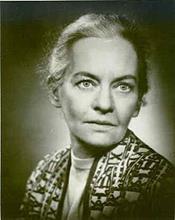
Arnow Conference 2025
From the hollers to the Hills, Our voices, Our Stories
About the Conference
The Arnow Conference for the Humanities was established at Somerset Community College to pay tribute to the literary contributions of Harriette Simpson Arnow, who grew up in Pulaski County, and whose work, both fiction and nonfiction, focuses on the rural Kentuckians she knew best. Each year, the conference brings together writers, scholars, academics, and others interested in literature and the arts for academic presentations and brief writing workshops to discuss and honor both the literature of Harriette Arnow and the writers and others whose own work she has inspired and informed.
Harriette Arnow: Her Inheritance and Her Legacy
by Sharon Whitehead
 Theories abound concerning the ancestry and character of the early settlers in the
Kentucky hills. They have been traced to Scottish chieftains, to English yeoman farmers,
and indentured servants. They have been called hardy, self-reliant, and independent,
as well as illiterate, uncouth, and undisciplined. Others attribute to these early
hill people traits such as individualism and stoicism, but also traditionalism, fatalism,
and religious fundamentalism.
Theories abound concerning the ancestry and character of the early settlers in the
Kentucky hills. They have been traced to Scottish chieftains, to English yeoman farmers,
and indentured servants. They have been called hardy, self-reliant, and independent,
as well as illiterate, uncouth, and undisciplined. Others attribute to these early
hill people traits such as individualism and stoicism, but also traditionalism, fatalism,
and religious fundamentalism.
Whatever their exact origin and character, the Kentucky hill people proved to be resilient. They managed to survive and flourish in virtual isolation for nearly a century, developing a culture in which utilitarian handcrafts, the ballad, the fiddle, and the recipe for home brew were features of everyday life. During the first half of the twentieth century, however, the outside world came to call in the form of land speculators, mining and lumber operators, road builders, missionary teachers, preachers, and the United States Government.
Harriette Simpson Arnow, born in Wayne County, Kentucky, and raised in Burnside, wrote about the Kentucky hill people as they experienced unprecedented social and economic change in their region from the 1920s through the 1940s. Through a number of short stories and the trilogy of novels for which she is best known, Mountain Path (1936), Hunter’s Horn (1949), and The Dollmaker (1954), Arnow viewed the transformation of hill society through compelling female characters.
This tribute to Arnow’s heritage and legacy begins with a quote from Mountain Path. Arnow’s novel is written from the perspective of a young teacher from Lexington who moves into the Cavecreek community of Somerset County, Kentucky. Louisa Sheridan is intensely curious about human behavior in general and about the folkways of the people among whom she lives and works. Louisa captures the essence of hill society in the following astute observation: “She sat and listened to the music and watched the people in the room—the women sitting quiet in the shadow and the men in the full glow of the lamplight and firelight” (311). While this novel is the earliest of the three novels in a trilogy, it has the same impetus as Hunter’s Horn and The Dollmaker. That impetus is to bring the hill women out of the shadows and to highlight their complexity of character, their genius as well as their ignorance and fatalism, and the extent of their limitations as well as their power.
Through the strong characters in her stories, Arnow explored not just the complicated roles of men and women in the Kentucky hills. She examined with brutal honesty the broader forces shaping the lives of the people in her world: the impact of the natural environment upon the people; the influence, positive and negative, of outside agencies in the region; the outmigration of the people during the 30’s and 40’s, especially to industrial centers of the north, and the subsequent draining of the human resources from rural communities; the religious beliefs and practices of churches in the region that provided comfort from life’s storms or stymied introspection, growth, and change. Harriette Arnow pursued the ancient themes of pride, honor, love, betrayal, envy, hatred, and grief alongside the modern themes of human isolation, alienation, powerlessness, and despair, of urbanization and impersonalization.
For these reasons, we dedicate this conference to Arnow’s genius and to those whom she has inspired.
Sharon Whitehead, Dean of Arts & Science at Somerset Community College, wrote her thesis at Stetson University focusing on Arnow’s Kentucky trilogy: Mountain Path, Hunter’s Horn, and The Dollmaker.
Presentations Schedule
All events are free and open to the public!
Location: Somerset Campus
Presentation at 2 p.m.
Jerry Deaton is a retired lobbyist originally from Breathitt County and currently living in Frankfort. He has written two books, Appalachian Ghost Stories, and Kentucky Boy. In addition, Jerry has written three plays, Tales From Bloody Breathitt; Long Ago and Far Away; and The Feuds of Bloody Breathitt. He also has written and produced two documentary films, The Feuds of Bloody Breathitt; and Harry Caudill: Man of Courage.
Location: London Campus
Presentation at 2 p.m.
Jerry Deaton is a retired lobbyist originally from Breathitt County and currently living in Frankfort. He has written two books, Appalachian Ghost Stories, and Kentucky Boy. In addition, Jerry has written three plays, Tales From Bloody Breathitt; Long Ago and Far Away; and The Feuds of Bloody Breathitt. He also has written and produced two documentary films, The Feuds of Bloody Breathitt; and Harry Caudill: Man of Courage.
Call for Submissions
Please submit any theme-related art, music, writing, and photography you would like to showcase in the 2025 Arnow Conference for the Humanities to michael.bloomingburg@kctcs.edu.
